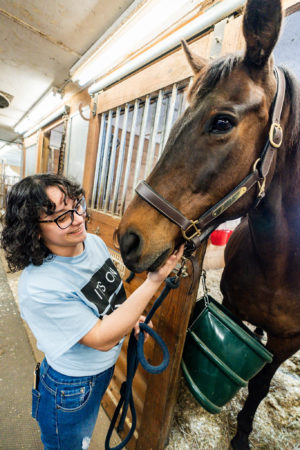Admissions
Admissions Requirements
- High school diploma or GED is required of all applicants (AVMA requirement).
Entry freshman college students (from high school or who hold a GED):
- Copies of high school transcript or GED scores
- Must place into college-level Math and English via scores on the SAT or ACT (within past 3 years) or College Placement Testing (Accuplacer):
- SAT: > 530 in Math and >480 in English
- ACT: >21 in Math and >28 in English
- Accuplacer: >246 or above in math, 4-8 on the essay
Transfer student from another college:
- A grade of ‘C’ or better in college level Math, Science and English
- Recommended: College Algebra, Fundamentals of Chemistry and Fundamentals of Composition
Transferring into the VT Program from other majors at Manor:
- A grade of ‘C’ or better in MH110 College Algebra, CH101 Fundamentals of Chemistry and EN101 Fundamentals of Composition I or EN103 Oral Communications
Completion of the following is not required, but highly recommended for success in the VT Program:
- 1 year H.S or college Biology and Chemistry with a labs
- 2 years H.S. or college Math including one year of regular Algebra
- Minimum High School GPA of 3.0
- Minimum High School or College Science and Math GPA of 3.0
Additional Noteworthy Points:
Technical Ability Standards, Required Immunizations and Documentation:
- Applicants must read and acknowledged their understanding of the Technical Ability Standards, which outline requirements for successful performance in the profession.
- Prior to matriculation, students in the Program must be fully immunized against rabies (no exemptions), and tetanus and must show evidence of having health insurance.
- Prior to matriculation, students are required to submit background clearances (FBI, PA background, Child Abuse).
- All other required forms must be submitted to the program prior to start of the semester.
Licensure:
A prior criminal record may preclude a graduate of the program from licensure by the Pennsylvania State Board of Veterinary Medicine and a student should consult with them prior to matriculation if they have questions/concerns.
Animal Care Responsibilities:
Laboratories that involve hands-on training with animals also include animal care duties outside of class time. Students should anticipate and plan for completing these additional responsibilities.
Accessing Externship Sites:
Off-campus, clinical externships are completed in the last semester by all veterinary technology students regardless of prior experience. Many externship sites and off-campus laboratories are not accessible via public transportation. Not having a driver’s license or having access to a car will restrict site selection and can compromise the externship experience.
Program Limitations:
Program enrollment is limited by clinical space, and no more than 60 students per academic year will be admitted. This includes all part-time and full-time students.
Students enrolling Full-Time in the spring semester:
All required first year course work needs to be completed in the spring and subsequent summer semesters in order to start the second year of the program in the Fall. Otherwise, students should be counseled to start as a part time student.